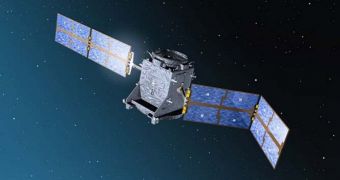Officials at the European Space Agency (ESA) are proud to announce that the payload assembly for the first ever satellite in the Galileo satellite navigation constellation has just left the Portsmouth, the United Kingdom, this morning. The equipment is en route to Italy from its assembly factory. Once it arrives, it will begin undergoing final preparations for its flight. The Galileo network will represent Europe's alternative to the American-built Global Positioning System (GPS), with the difference that the new satellite grid will provide accurate localization for individual users as well.
The GPS is a military service, and so civilian operators only receive somewhat accurate signals from its satellites, whereas military personnel benefits from pinpoint accuracy on their devices. The Galileo service will provide that for all of its users, ESA officials say. And it is the job of the Proto-flight Model 1 instrument to pave the way for that to happen. It will be outfitted with all the equipment needed to relay accurate timing and location data to its users, experts say, quoted by the BBC News.
“We should be ready for an April [2011] flight and this is a very significant step towards that achievement,” says of the occasion the EADS Astrium head of navigation, Dr Mike Healy. The company is under contract with ESA to deal with the integration of all components that will constitute the payload for the first Galileo satellite. The first stage in the project is the In-Orbit Validation (IOV) effort, which will also include the launch of proto-flight Model 1. Three additional spacecraft will also be launched, and the four will operate in a small constellation, that will help ESA figure out if the future network rises up to the expectations everyone has of it.
After IOV concludes, the actual construction of Galileo will begin. A number of 14 Full Operational Capability (FOC) satellites have already been ordered and contracted, with many more on their way if all goes according to plan. At this time, engineers at Rome, Italy-based Thales Alenia Space are eager to receive the new payload, so that they can begin working on integration procedure. The equipment will be affixed to its chassis, which also include avionics controls, a propulsion system, and solar panels for producing electrical energy.

 14 DAY TRIAL //
14 DAY TRIAL //